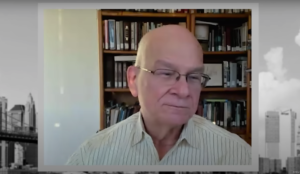The truth of the Gospel affects every part of us, including our thought life. When Jesus told the disciples he was going away, he also said he would give them peace unlike what the world gives. (John 14). Romans 12 urges us, “Do not conform to the pattern of this world, but be transformed by the renewing of your mind.”

Some scriptures are easy to understand but harder to put into practice, especially in the age of the 24-hour news cycle. In this world where news changes by the minute, many of us feel like there is not enough time to grieve all the sad news of loss that comes with living in this broken creation. The digital world we live in allows us to access more stimuli than our minds were ever meant to take in.
Unlike the way we took in news in the past, it is common now for video content, audio clips, and real-time reactions to traumatic events to pop up in our feed. Plus, there are never-ending calls to action and a deluge of data, which do not allow our minds and hearts to process and digest what we are seeing. Yet, the Gospel of love and grace still reigns above and in all that is going on. So how do we internalize Christ’s peace when there is so much noise on our devices all the time?
It takes practice. God did not create us to be always connected to the entire world and its continual stream of loss and pain. The constant up-close, live feed of global suffering and the varied reactions to every event are beyond our human capacity. In our bodies, and especially our minds, we will react to the overload by shutting down or getting anxious. We may develop irregular sleep routines, racing or negative thoughts, or a dominant feeling of despair, fear or worry.
How does the Gospel come into those moments? As Christians, we want to be informed and have a heart of compassion for the broken world, just as Jesus entered our suffering. But we do not want to do so unwisely. We need to be thoughtful stewards of our minds and bodies. Philippians 4:6,7 states, “Do not be anxious about anything, but in every situation, by prayer and petition, with thanksgiving, present your requests to God. And the peace of God, which transcends all understanding, will guard your hearts and your minds in Christ Jesus.” How do we move from becoming anxious about what we see and read to maintaining peace as we build a habit of turning to God with prayers and petitions based on what is going on? And how do we keep from letting our minds go down an endless spiral of negative information and instead choose to set our minds on things above (Col. 3:2)?
We want to be informed and have a heart of compassion for the broken world, just as Jesus entered our suffering. But we do not want to do so unwisely. We need to be thoughtful stewards of our minds and bodies.
These are some practical steps to help you take in the media, especially the news, in healthy and godly ways. They are based on best counseling practices, as well as the deep truths of scripture. If you counsel others as a pastor, ministry leader or lay counselor, this counseling toolkit applies similar principles from the perspective of walking people you counsel through their media diets.
- The first step is to move from mindless scrolling to a more thoughtful approach. Take 30 minutes to evaluate your social media feeds. Use a journal or document to take notes. Talk it through with someone you trust. Answer some of these questions:
- Where do you get your news?
- What are some of the repeated messages you see?
- How are your beliefs shaped by this platform?
- Be thoughtful about the mode through which you take in information. Our bodies and hearts are more affected by sensory stimuli (visuals, auditory, etc.) than by words. The more you want things to affect you, the more sensory modes you should use. For example, videos with sound can help move you into worship or take in art. When you want to know the information but not have it affect you as deeply, use less sensory modes. With distressing news events, consider a slower print form such as reading articles, rather than scrolling through soundbites and visuals.
- Start to set time limits on taking in new information. The time will vary from person to person, but make the limit based on how quickly and often you become overwhelmed by the media and the news. Weave media breaks into your day. This will help your brain rest and reset.

- Identify a specific time to start and stop taking in news and social media, unless there is a personal emergency. Having regular morning and evening rituals that bookend your days with ways to connect with God (reading scriptures and devotionals, listening to praise music, etc.) can help protect your sleep. Guard your heart from continual emotional flooding, so when you spend time connecting with others and God, you are refreshed and renewed. View your social media feed as an opportunity to be aware of how to intercede for the themes you see emerging in society, rather than personalizing all the information and feeding anxiety or other overwhelming emotions.
- Look for uplifting content. Taking the wisdom of Philippians 4:8 to set your mind on things that are true, noble, and right, look for content online about local efforts that are restoring hope and giving back to communities. Negativity bias can easily keep your focus on adverse events, so practice taking in and dwelling on the more positive stories and seeking where God is working in your life and in the lives of those around you.
- Build your support system. Think about who you go to when you are in distress. Can you identify unhelpful companions for processing information? Who makes you more angry, fearful or anxious when processing the news or media? Who helps you feel clearer and better prepared to handle what’s going on around you? Who helps you rely more on God? Spend more time with the helpful people and start to shift away from processing information with the more unhelpful friends.
- Reconnect back to God. Bring trusted people in your life around you to help your hurting and weary heart seek Jesus for comfort. Explore what helps ground and center you in the knowledge of God as the ultimate source of hope.

You can try deep, slow breathing while reading through or speaking a short scripture. You can take time to be silent before God. You can use your imagination while you pray to focus your mind on a characteristic of Jesus; take a walk in nature while you intercede; or put on calming videos with soft praise music to calm your mind. Find ways that help you connect deeply with other believers, both through things such as going to church or joining a small group—and more creative ways like outings together or doing artistic projects, or partaking in online Gospel-centered conversations.
Our prayers can affect things that are happening in the world around us and they can help bring peace to chaotic situations, as well. We just have to make sure we are not overwhelmed in the process of taking in too much. Thankfully, we have a God who does not sleep (Psalm 121), who is able to bear the emotional weight that comes with all the knowledge that modern technology brings. We can be honest with Him in prayer about how the news affects us. He always intercedes for us and what is happening in the world (Hebrews 7:25). He understands our need for connection as well as for rest. With His guidance and with practical wisdom, we can develop healthy media habits.
Redeemer Counseling Services serves more than 1,500 clients each year in the greater New York City area. Most client sessions are supported through generous donations that help keep counseling costs affordable. To learn more about giving to Redeemer Counseling Services and to receive free mental health resources and updates, sign up here.




